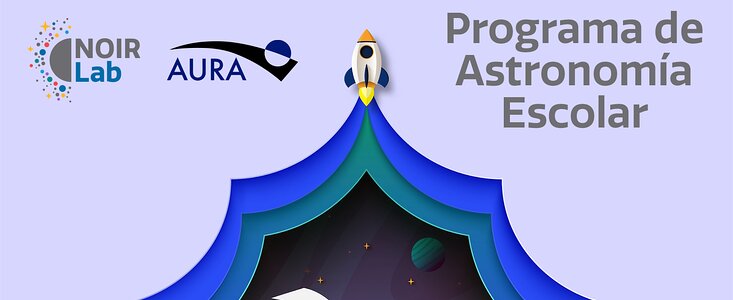Chilean Teachers Participate in NOIRLab’s Training Program for Astronomy
More than 30 educators in Chile will take advantage of a Star Educators Program led by NSF's NOIRLab
19 April 2022
The Solar System, the Moon and its features, the stars, the constellations, the properties of light, and the preservation of dark skies will be some of the topics featured in the Scholar Astronomy Program, part of NOIRLab's Star Educators program. The program will engage more than 80 teachers from Vicuña, Paihuano, Montepatria, and La Serena in Chile, on topics related to basic astronomy and the science of NOIRLab facilities to complement and reinforce subjects included in the Chilean science curriculum. The program is a joint endeavor of NSF's NOIRLab and AURA in Chile.
In a series of virtual sessions that began on 7 April 2022 and comprises 23 hours of training over 7 months, teachers will obtain first-hand information about basic astronomy, as well as the main features of astronomical observatories in the Region of Coquimbo, and general concepts about NOIRLab’s astronomical technologies. Educators will also have the opportunity to delve into these topics by interacting with experts in virtual talks, panels, and conversations.
Deputy Director of AURA in Chile, Hernán Bustos, said, "We are very happy to be able to deliver this training for teachers from the communities surrounding our observatory, who have always been very interested in learning about astronomy and the night sky. Without a doubt, these sessions will allow teachers to have more tools so that a large number of students can approach science and we can promote interest in careers in astronomy, technology, engineering and mathematics among young people in the region.”
Head of the Municipal Educational Administration Department of Vicuña, Gabriel Pastén, adds, "This training is very relevant since it will showcase astronomy and the different careers that it supports. Among its many other contributions, the program also strengthens the culture of astronomy among our students.”
Complementary program activities include training in the free software Stellarium to use when observing the night sky, as well as practice in making light pollution measurements using the Globe at Night citizen-science campaign app.
After completion of the program, teachers will be given a certificate in recognition of their participation.
More information
NSF’s NOIRLab(National Optical-Infrared Astronomy Research Laboratory), the US center for ground-based optical-infrared astronomy, operates the International Gemini Observatory(a facility of NSF, NRC–Canada, ANID–Chile, MCTIC–Brazil, MINCyT–Argentina, and KASI–Republic of Korea), Kitt Peak National Observatory (KPNO), Cerro Tololo Inter-American Observatory (CTIO), the Community Science and Data Center (CSDC), and Vera C. Rubin Observatory(operated in cooperation with the Department of Energy’s SLACNational Accelerator Laboratory). It is managed by the Association of Universities for Research in Astronomy (AURA) under a cooperative agreement with NSF and is headquartered in Tucson, Arizona. The astronomical community is honored to have the opportunity to conduct astronomical research on Iolkam Du’ag (Kitt Peak) in Arizona, on Maunakea in Hawai‘i, and on Cerro Tololo and Cerro Pachón in Chile. We recognize and acknowledge the very significant cultural role and reverence that these sites have to the Tohono O'odham Nation, to the Native Hawaiian community, and to the local communities in Chile, respectively.
Links
Contacts
Amanda Kocz
Communications Manager
NSF's NOIRLab
T: +1 520 318 8591
Email: amanda.kocz@noirlab.edu
Manuel Paredes
Outreach Manager Chile
T: +56 512 205 671
Email: manuel.paredes@noirlab.edu


